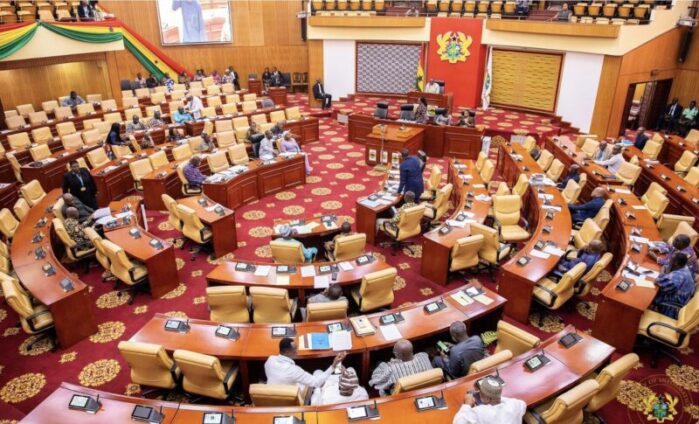The recent happenings in Ghana's Parliament have left many wondering whether politicians are actually working for the people or simply pursuing their personal interests. Ghanaians have expressed fury and irritation over Parliament's indefinite adjournment due to the absence of NPP MPs. It is intolerable that the NPP and NDC leadership in Parliament are unable to find common ground and work together to improve the lives of those in need.
The current predicament serves as a sharp reminder of the winner-takes-all mindset that has persisted in Ghanaian politics for far too long. The NPP and NDC have been at odds, with each wanting to demonstrate its control rather than collaborating for the common interest. This petty fighting has resulted in blocked legislative progress, wasted taxpayer's money, and a general feeling of dissatisfaction among citizens.
This political gridlock in Ghana's Parliament is a concerning development that demands immediate attention and resolution. The ongoing tussle between the New Patriotic Party (NPP) and the National Democratic Congress (NDC) caucuses over seating arrangements and the failure to attend parliamentary sessions has not only disrupted legislative proceedings but also jeopardised the nation's progress.
At the heart of this crisis lies a troubling reality: the quest for political dominance has overshadowed the fundamental purpose of Parliament – to serve the best interests of the Ghanaian people. The taxpayers, who bear the burden of the resources allocated for these recall sessions, are the true victims of this power struggle.
It is time for the leadership of the NPP and NDC to rise above partisan politics and demonstrate true statesmanship. The nation's well-being should be the primary concern, not the narrow interests of political parties.
Firstly, the NPP and NDC must engage in constructive dialogue and negotiations to find a mutually acceptable solution to the seating arrangement dispute.
This is not a matter of ego or pride, but a crucial step towards restoring the integrity and functionality of Parliament. Both sides should be willing to compromise, recognising that the greater good of the nation supersedes individual political agendas.
Secondly, the leaders of both parties must prioritise attendance and participation in parliamentary sessions. Boycotting or refusing to attend these sessions not only wastes taxpayer money but also deprives the Ghanaian people of the critical legislative action they deserve. Attendance and engagement should be seen as a solemn duty, not a political tactic.
Moreover, the leadership of the Peace Council and other respected institutions should intervene to facilitate constructive dialogue between the NPP and NDC. These neutral parties can play a crucial role in bridging the divide, encouraging compromise, and reminding both sides of their responsibilities to the nation.
It is equally important to explore the possibility of reforming parliamentary procedures and rules to prevent such gridlocks from occurring in the future.
This may involve establishing clear guidelines for seating arrangements, attendance requirements, and the consequences for non-compliance. By institutionalising these measures, Parliament can become a more effective and reliable institution, one that truly serves the needs of the Ghanaian people.
The broader implications of this parliamentary impasse cannot be overstated. If left unresolved, it could erode public trust in the democratic process, undermine the credibility of the legislature, and ultimately hinder the country's social and economic progress.
The Ghanaian people deserve a government that is united in its commitment to serving their best interests, not one consumed by petty political rivalries.
In conclusion, the resolution of the parliamentary impasse requires a courageous and statesmanlike approach from the NPP and NDC leadership.
They must put aside their differences, engage in genuine dialogue, and prioritise the well-being of the nation over their own political agendas. Only then can Ghana's Parliament fulfill its essential role as the cornerstone of a vibrant democracy, working tirelessly to address the pressing issues facing the country and its citizens.
Are these politicians making a fool out of us? What wrong at all have we done to NPP and NDC leadership in parliament? If unity isn't achieved, Ghanaians should punish MPs at both sides of the parliamentary leadership for their failed attempts to improve the lives of the suffering Ghanaians. We need politicians who will put aside their differences and work towards creating a better future for all.
Latest Stories
-
‘I’m bringing back the Red Line’ – Accra Mayor vows to decongest Accra streets for good
37 minutes -
Can Mandela’s former negotiator charm Donald Trump?
1 hour -
UN court backs E Guinea in Gabon dispute over islands in oil-rich waters
1 hour -
Tanzania president warns ‘meddling’ Kenyan activists
2 hours -
Nigeria’s fierce political rivals share joke at pope’s inaugural mass
2 hours -
World-first gonorrhoea vaccine launched by NHS England as infections soar
2 hours -
EU plans €2 fee on small parcels in hit to Shein and Temu
2 hours -
Doubts over whether Brits can use EU e-gates this summer
2 hours -
Trump pressures Republicans to back his ‘big beautiful’ tax bill
3 hours -
Zelensky accuses Russia of ‘buying time’ to stall truce talks
3 hours -
Man who helped smuggle more than 3,000 people into Europe jailed
3 hours -
Jennifer Lopez sued in copyright case for posting photos of herself
3 hours -
US congresswoman charged with assault outside immigration centre
4 hours -
Court orders mental evaluation for extradited Togolese robbery suspect
4 hours -
Police destroy 120 changfang machines at Wassa Gyapa
5 hours

